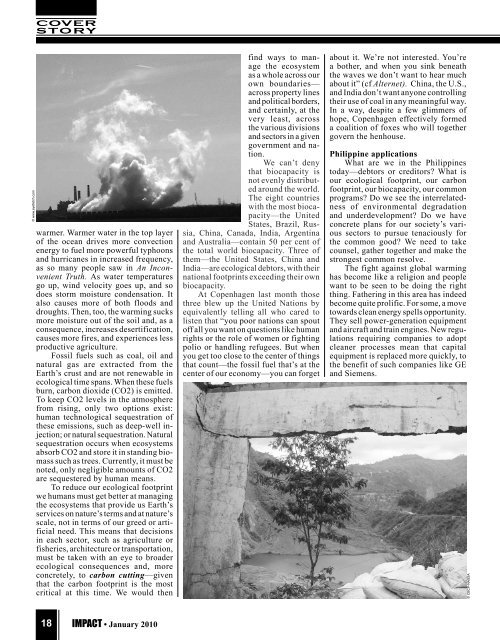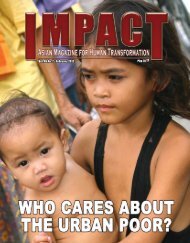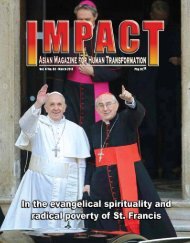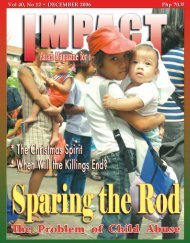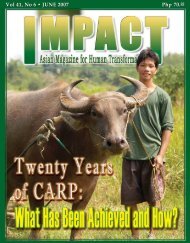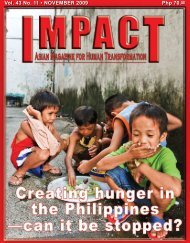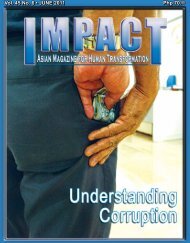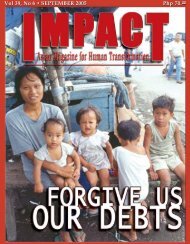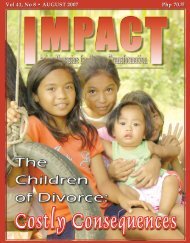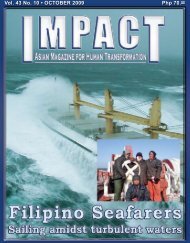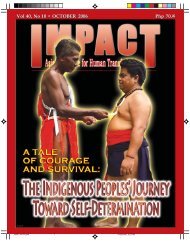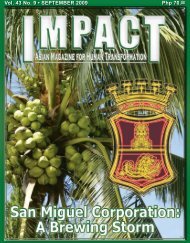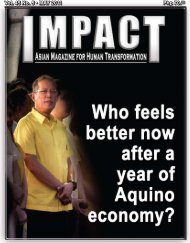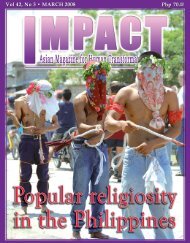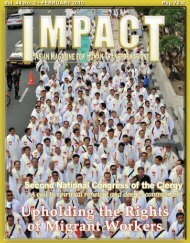Php 70.00 Vol. 44 No. 1 • JANUARY 2010 - IMPACT Magazine Online!
Php 70.00 Vol. 44 No. 1 • JANUARY 2010 - IMPACT Magazine Online!
Php 70.00 Vol. 44 No. 1 • JANUARY 2010 - IMPACT Magazine Online!
Create successful ePaper yourself
Turn your PDF publications into a flip-book with our unique Google optimized e-Paper software.
COVER<br />
STORY<br />
© www.eyefetch.com<br />
warmer. Warmer water in the top layer<br />
of the ocean drives more convection<br />
energy to fuel more powerful typhoons<br />
and hurricanes in increased frequency,<br />
as so many people saw in An Inconvenient<br />
Truth. As water temperatures<br />
go up, wind velocity goes up, and so<br />
does storm moisture condensation. It<br />
also causes more of both floods and<br />
droughts. Then, too, the warming sucks<br />
more moisture out of the soil and, as a<br />
consequence, increases desertification,<br />
causes more fires, and experiences less<br />
productive agriculture.<br />
Fossil fuels such as coal, oil and<br />
natural gas are extracted from the<br />
Earth’s crust and are not renewable in<br />
ecological time spans. When these fuels<br />
burn, carbon dioxide (CO2) is emitted.<br />
To keep CO2 levels in the atmosphere<br />
from rising, only two options exist:<br />
human technological sequestration of<br />
these emissions, such as deep-well injection;<br />
or natural sequestration. Natural<br />
sequestration occurs when ecosystems<br />
absorb CO2 and store it in standing biomass<br />
such as trees. Currently, it must be<br />
noted, only negligible amounts of CO2<br />
are sequestered by human means.<br />
To reduce our ecological footprint<br />
we humans must get better at managing<br />
the ecosystems that provide us Earth’s<br />
services on nature’s terms and at nature’s<br />
scale, not in terms of our greed or artificial<br />
need. This means that decisions<br />
in each sector, such as agriculture or<br />
fisheries, architecture or transportation,<br />
must be taken with an eye to broader<br />
ecological consequences and, more<br />
concretely, to carbon cutting—given<br />
that the carbon footprint is the most<br />
critical at this time. We would then<br />
find ways to manage<br />
the ecosystem<br />
as a whole across our<br />
own boundaries—<br />
across property lines<br />
and political borders,<br />
and certainly, at the<br />
very least, across<br />
the various divisions<br />
and sectors in a given<br />
government and nation.<br />
We can’t deny<br />
that biocapacity is<br />
not evenly distributed<br />
around the world.<br />
The eight countries<br />
with the most biocapacity—the<br />
United<br />
States, Brazil, Russia,<br />
China, Canada, India, Argentina<br />
and Australia—contain 50 per cent of<br />
the total world biocapacity. Three of<br />
them—the United States, China and<br />
India—are ecological debtors, with their<br />
national footprints exceeding their own<br />
biocapacity.<br />
At Copenhagen last month those<br />
three blew up the United Nations by<br />
equivalently telling all who cared to<br />
listen that “you poor nations can spout<br />
off all you want on questions like human<br />
rights or the role of women or fighting<br />
polio or handling refugees. But when<br />
you get too close to the center of things<br />
that count—the fossil fuel that’s at the<br />
center of our economy—you can forget<br />
about it. We’re not interested. You’re<br />
a bother, and when you sink beneath<br />
the waves we don’t want to hear much<br />
about it” (cf Alternet). China, the U.S.,<br />
and India don’t want anyone controlling<br />
their use of coal in any meaningful way.<br />
In a way, despite a few glimmers of<br />
hope, Copenhagen effectively formed<br />
a coalition of foxes who will together<br />
govern the henhouse.<br />
Philippine applications<br />
What are we in the Philippines<br />
today—debtors or creditors? What is<br />
our ecological footprint, our carbon<br />
footprint, our biocapacity, our common<br />
programs? Do we see the interrelatedness<br />
of environmental degradation<br />
and underdevelopment? Do we have<br />
concrete plans for our society’s various<br />
sectors to pursue tenaciously for<br />
the common good? We need to take<br />
counsel, gather together and make the<br />
strongest common resolve.<br />
The fight against global warming<br />
has become like a religion and people<br />
want to be seen to be doing the right<br />
thing. Fathering in this area has indeed<br />
become quite prolific. For some, a move<br />
towards clean energy spells opportunity.<br />
They sell power-generation equipment<br />
and aircraft and train engines. New regulations<br />
requiring companies to adopt<br />
cleaner processes mean that capital<br />
equipment is replaced more quickly, to<br />
the benefit of such companies like GE<br />
and Siemens.<br />
© CBCP-NASSA<br />
18<br />
<strong>IMPACT</strong> <strong>•</strong> January <strong>2010</strong>


